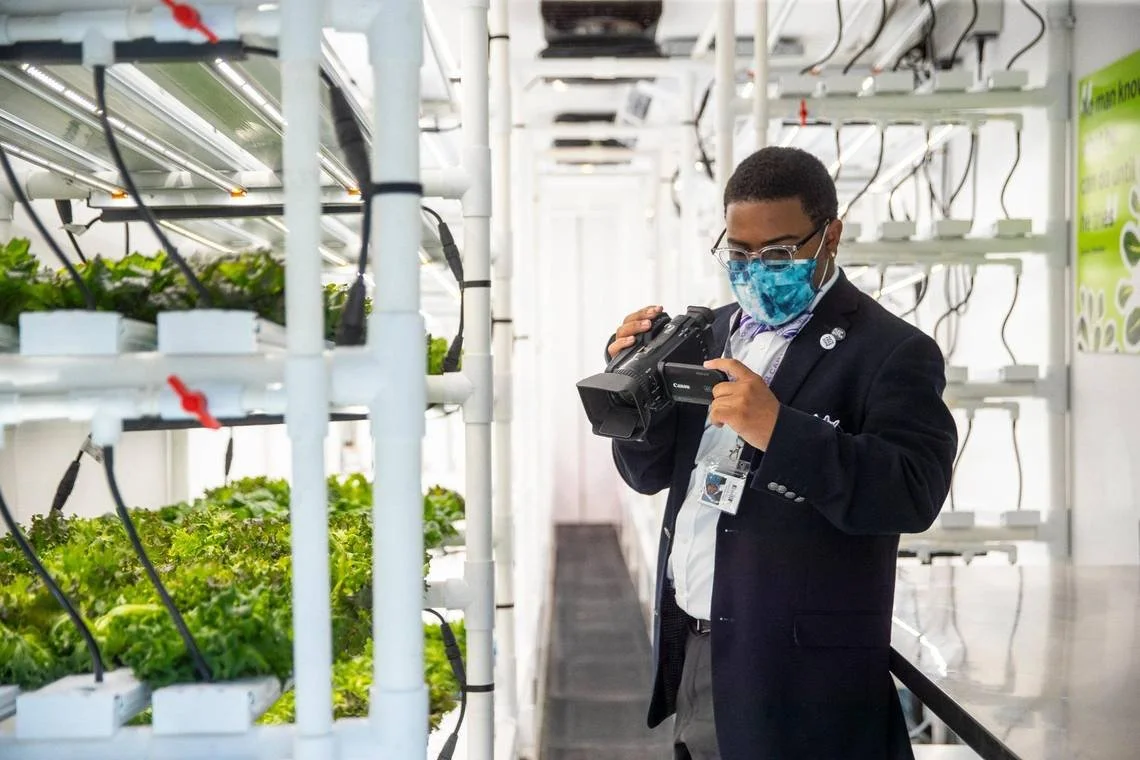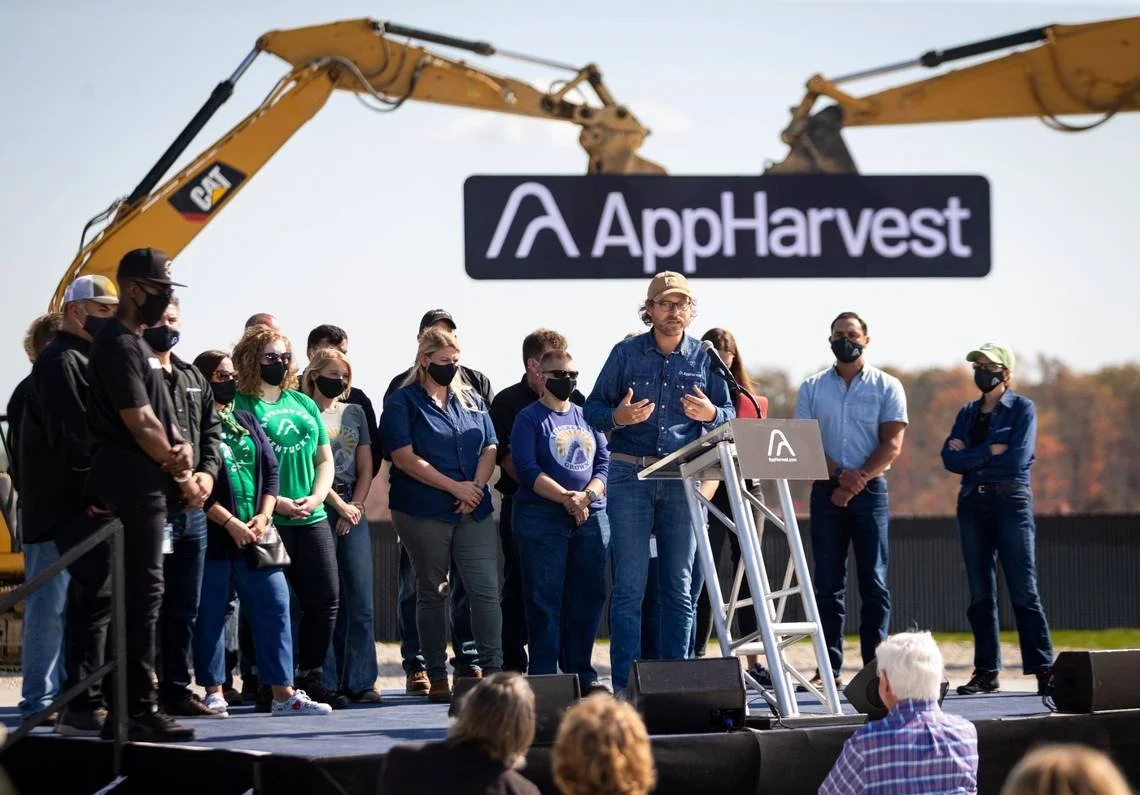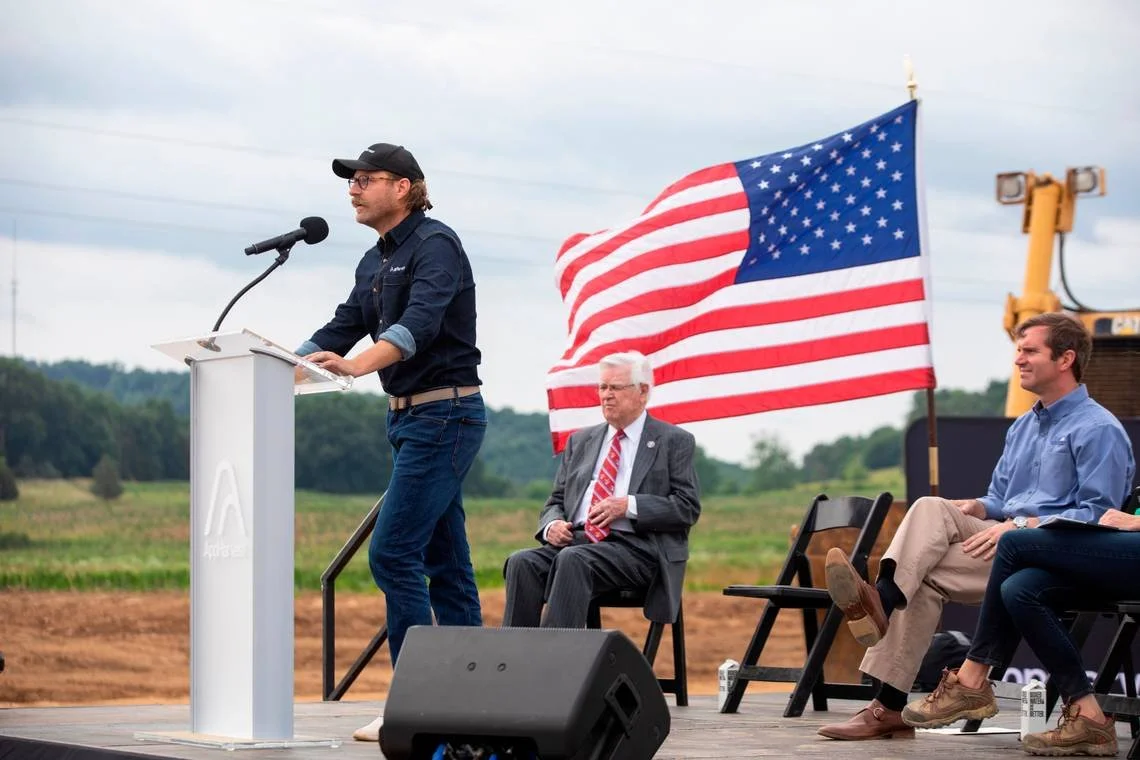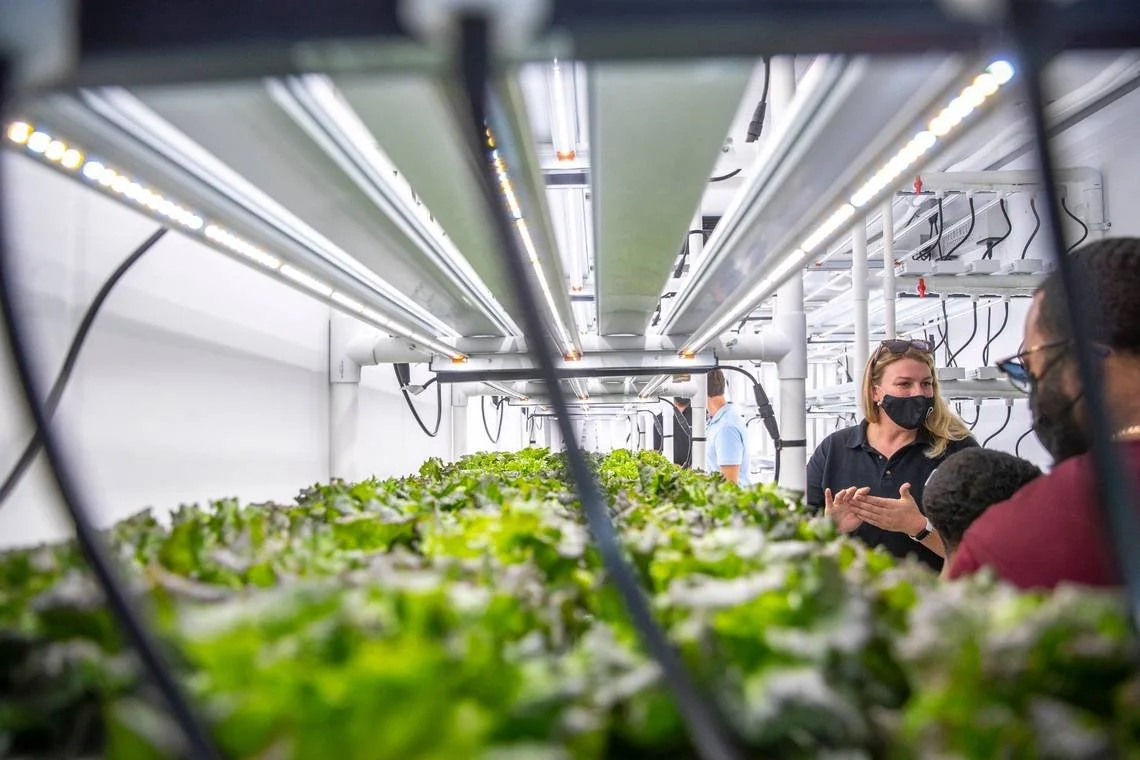’What Has AppHarvest Done For Eastern Kentucky? ‘ They’ve Delivered The Jobs.
BY RICK CHILDRESS
NOVEMBER 22, 2022
AppHarvest breaks ground on two new facilities, one in Morehead and one Somerset. Both are anticipated to be completed by the end of 2022. These two facilities are part of AppHarvest’s goal to have 12 indoor farms by the end of 2025.
AppHarvest faces challenges for its future Kentucky-based produce company AppHarvest had ambitious plans to build a dozen huge indoor farms in Central Appalachia, but now it’s searching for cash just to keep going.
This fall all the lettuce used by the Rockcastle County School system is being grown by students in a shipping container outside the county high school.
“Our school system right now, they can’t find lettuce anywhere else, because there’s supply chain issues and stuff,” said Matt Whitaker, an agriculture teacher at Rockcastle County High School. “So we’re the only lettuce supplier in our school system right now.”
Students have been planting and harvesting the lettuce during greenhouse classes that Whitaker teaches. Their farm classroom, which has operated since August, is a high-tech hydroponic vegetable garden inside a shipping container paid for by financial services firm Cowen and supplied by Kentucky’s mega greenhouse company, AppHarvest.
These are 40-foot, steel shipping containers that have been retrofitted with HVAC, LED and irrigation system to allow students to grow these leafy greens and you can do herbs,” said Amy Samples, the vice president of community outreach and the director of the AppHarvest Foundation, the company’s charitable giving and education arm.
The container farm in Rockcastle County is the 12th and latest such facility that AppHarvest and its community partners have planted from Lexington to Pikeville. According to Whitaker, the student-grown lettuce has brought pupils pride in the lunchroom and across the region. Eastern Kentuckians, he said, feel “looked down on” by the rest of the country, but investments from a company like AppHarvest help turn that feeling around.
“It kind of makes it to where people start to look at our region and say, ‘We want to be like that. We want to do what they are doing,’” Whitaker said. “We kind of have become sort of the cutting edge in this area of hydroponic vegetable production.”
The first container farm opened at Pikeville’s Shelby Valley High School in 2018 – nearly two years prior to AppHarvest’s construction of its first mega greenhouse. Since then, local officials have been more apt to judge the company’s success not just by the greens going into school lunches but by the greens going into local pockets and county coffers.
Jathan Briscoe, a 12th grader at Carter G. Woodson Academy, takes video of AppHarvest’s first container farm in an urban location, which is located outside the school, in Lexington, Ky., on Friday, Sept. 17, 2021. Ryan C. Hermens rhermens@herald-leader.com
‘THEY’VE DELIVERED’
From nearly its inception, AppHarvest has promised jobs and economic development to swaths of southern and eastern Kentucky that badly need both.
In 2018, CEO and founder Jonathan Webb said he wanted to turn Kentucky’s coal country into “the high-tech greenhouse capital of the U.S.” At the time, the company was set on building its first greenhouse in Pikeville on top of reclaimed mine land. But after engineers told the company that it might not be prudent to build a large, glass structure on land that can shift, AppHarvest pivoted to build in Morehead.
“At that point, the amount of skepticism the company garnered if you kind of go back and look and read some: The company was never going to build, we were never going to achieve,” Webb told the Herald-Leader in a recent interview. “There’s plenty of healthy skepticism given just the amount of things that haven’t happened in the eastern part of the state and then we went and we bounced back.”
The mega greenhouse company is far from the only business to promise multi-million dollar facilities and hundreds of jobs. But unlike many of those companies, AppHarvest has so far actually delivered, local officials say.
“I think they’ve delivered the jobs, they’ve delivered the revenue streams in taxes,” said Harry Clark, the judge-executive in Rowan County. “I think they’ve delivered to the county.” AppHarvest’s first greenhouse in Rowan County, just a few miles down I-64 from Morehead, regularly employs between 300 and 330 workers, said Jason Slone, the president and CEO of the Morehead-Rowan County Chamber of Commerce.
The massive 60-acre glass facility had its first harvest in January 2021 and can grow several thousands of pounds of tomatoes at a time. Employees come from multiple surrounding counties because of Morehead’s location along the interstate, Slone said.
Annually, the facility generates about $700,000 in property tax revenue, a majority of which goes to fund local schools plus county government, the health department and the library, Clark said. The county also gets roughly $210,000 per year via occupational and payroll taxes.
The company’s payroll is near 700 people, Webb said, and 99 percent of them “live in the region, go to schools in the region, pay taxes in the region.” He said he hopes that’s a testament to any other companies looking to open nearby.
“The workforce is thriving and available, and has certainly been the foundation that we’ve been able to build the company on,” Webb said.
AppHarvest founder and CEO Jonathan Webb speaks during a press conference announcing the opening of the first greenhouse facility in Morehead, Ky., Wednesday, October 21, 2020. The 60 acre, indoor facility is supposed to grow 45,000 pounds of tomatoes. Silas Walker swalker@herald-leader.com
AppHarvest founder and CEO Jonathan Webb speaks during a press conference announcing the opening of the first greenhouse facility in Morehead, Ky., Wednesday, October 21, 2020. The 60 acre, indoor facility is supposed to grow 45,000 pounds of tomatoes. Silas Walker swalker@herald-leader.com
ATTRACTING OTHER OPPORTUNITIES
The facilities’ location in Morehead has also attracted interest from other businesses in the food-manufacturing sector, Slone said. Companies interested in potentially moving some operations to Morehead have had 10 site visits to the area, half of those were at least somewhat connected to the food industry.
“That’s directly in correlation back to AppHarvest getting more known in the area.” Slone said.
AppHarvest has three other facilities in various stages of operation. A greenhouse growing mainly berries in Somerset and another growing mainly salad greens in Berea both just began operations in recent weeks. Plus, planting has begun in a 60-acre Richmond greenhouse growing tomatoes.
In Somerset, a new road to reach the AppHarvest facility is under construction and like in Morehead, other businesses are considering increasing operations in Pulaski County, said Chris Girdler, the president and CEO of the Somerset-Pulaski Development Authority.
“Without question, you are going to see a kind of an ecosystem built around AppHarvest over time,” Girdler said. “We’re already seeing some of it from your solar power companies. You’re seeing some of it from a logistics perspective, people that are looking to try to haul the product for them.”
AppHarvest CEO Jonathan Webb speak during a ceremony at the site of the company’s new greenhouse facility near Somerset, Ky., Monday, June 21, 2021. The company announced that facility and another in Morehead. The two greenhouses are part of AppHarvest’s goal to have 12 indoor farms by the end of 2025. Silas Walker swalker@herald-leader.com
The company is yet to turn a profit and faces multiple lawsuits from former investors, but many local officials say that AppHarvest’s best days are ahead. Girdler said company officials have consistently stressed to him that the company is “a long-term play.”
“It’s nothing that has taken away the excitement from us,” Girdler said. “Mr. Webb and his board and his people, from the very beginning, have said this is nothing that’s going to produce great dividends initially.”
Bruce Fraley, the mayor of Berea, expressed a similar sentiment. He’s heard concerns about the company from colleagues and other local officials but he still believes AppHarvest has a “winning concept.”
“I do think it’s a concept that’s time has come,” Fraley said. “And in time, I expect them to be profitable and successful.”
Mollie McKinney, AppHarvest ag tech program coordinator, gives a tour of AppHarvest’s first container farm in an urban location, located at Carter G. Woodson Academy in Lexington, Ky., on Friday, Sept. 17, 2021. Ryan C. Hermens rhermens@herald-leader.com
‘PART OF A GOOD STORY.’
Rockcastle County High School alone consumes about 20 pounds of lettuce a week, said Whitaker and so far students have produced enough for that school plus the rest of the district. Meanwhile, a colleague of Whitaker’s told him they couldn’t get lettuce for a salad they ordered while out to eat in Mount Vernon.
AppHarvest’s container farm enables students to do greenhouse work in the fall – a hands-on educational experience that usually takes place in the school greenhouse in the spring, Whitaker said. Students are “very, very excited to tell people about how they grow lettuce here at the school,” he added.
That’s the kind of pride that the AppHarvest Foundation’s Agtech Education Program seeks to foster, Samples said. The program seeks to respect the state’s agrarian history while also showing what the future of agriculture might look like.
“We still want our young people and our aunts and uncles doing hoop houses and backyard gardens,” Samples said. “But also we want them to understand that there are newer technologies that you can layer over to continue supporting our food system.”
When some schools aren’t using their container farms, a partnership with Maysville Community and Technical College enables adults who are in the later stages of addiction recovery to use the high-tech classrooms to learn the basics of hydroponic growing and earn a certificate, Samples said.
The AppHarvest Foundation partners with other organizations to gain funding for the AgTech education program. For those at the company and those involved in the program, it’s an opportunity to be “part of a good story,” Samples said. “There’s not a lot of downside here when you are able to find external funds and bring them to Appalachia to invest in Kentucky’s young people,” Samples said.
Read more at: https://www.kentucky.com/news/business/article269027837.html#storylink=cpy






